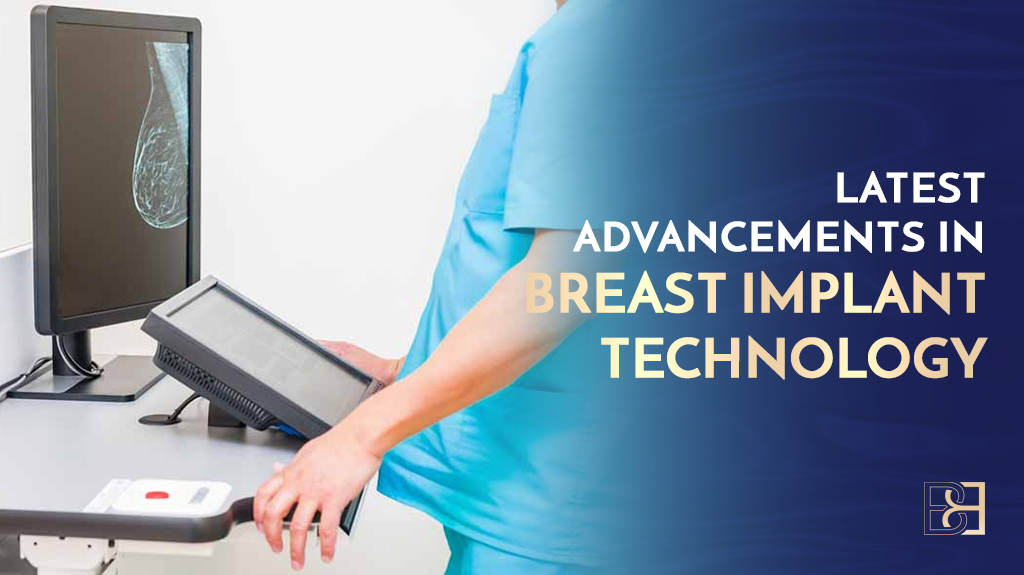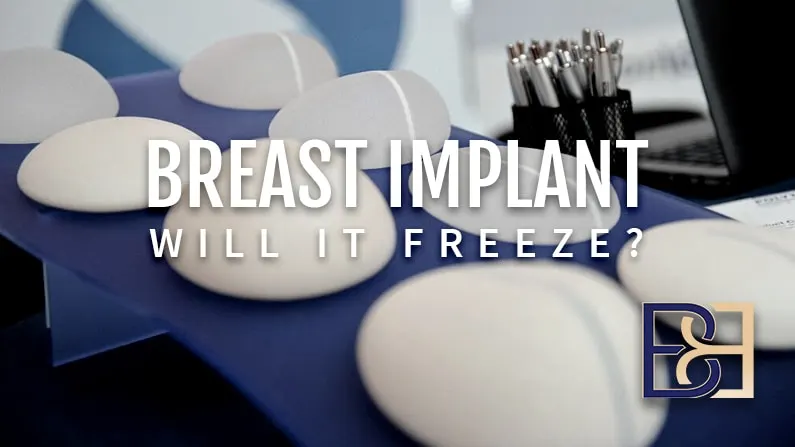Can breast implant freeze in cold weather? If you’re wondering about this, you’re not alone. It may seem like a silly question, but it makes sense to ask since implants are filled with liquid or gel.
It’s a smart question
Patients who live in cold climates or that love outdoor winter sports often have this question. They worry that being outside in very cold temperatures can damage the implant in some way. If you are concerned about it, this article will put your fears to rest. Later, Doctor Bernard Beldholm will walk you through an experiment he did with a real implant to find out what happens when you attempt to freeze an implant for one week in a freezer. The results may surprise you, so keep reading!
What’s inside an implant and will it freeze?
Different types of implants contain different materials. You have traditional silicone, gummy bear implants, saline implants, and more. (P.S., did you know that you can also get fat injections in your breasts?)
Science tells us that different materials freeze at different rates. Let’s find out what is inside each type of breast implant to get started.
What’s inside a silicone implant?
Silicone implants are arguably the most popular type of implant. They have been used for years. Silicone breast implants have an outer shell made of silicone and they also contain silicone in gel form. The gel thickness and implant fill level (ex. high-profile or low-profile implants) can vary.
Traditional silicone implants contain a soft, pliable gel inside. This helps them resemble the feel of natural breast tissue in terms of softness and movement as well as possible, considering it is not real breast tissue. If you have very little natural breast tissue, the feel of implants (no matter what they are made from) will be more obvious to the touch. But silicone gel is still a great and ** option. Silicone gel won’t freeze in your body.
What is in teardrop implants?
Next, we have the anatomic implants, or so-called teardrop implants or gummy bear implants, as they are affectionately named. These contain a firmer gel inside the implant to help maintain the teardrop shape. In fact, the material somewhat resembles the texture of gummy bear candy, hence the name. The gel is still made of silicone, it is just a thicker variety than standard silicone implants. Again, freezing inside the body is impossible.
How about saline implants?
Saline implants are a popular choice since they usually cost less. They also allow the patient to have smaller surgical scars. Like silicone implants, saline implants have a silicone shell with filling inside. However, saline implants contain a sterile salt water solution. Since water itself freezes, that is a big reason why women are concerned about breast implant freezing if they have saline implants. Guess what? It’s a myth that saline implants can freeze inside your body.
The real reason why breast implants don’t freeze
The real reason breast implants don’t freeze is threefold. Your body temperature, environment and the freezing points of different breast implants materials (relative to the temperatures you might be exposed to) all factor in.
Freezing points
The silicone gel in silicone implants is resistant to extremely cold temperatures. The freezing point of silicone gel is -55 degrees Celsius (or -67 degrees Fahrenheit). Saline implants are made of salt water. Salt water has a freezing point of -2 degrees Celsius (that is -28.4 degrees Fahrenheit).
The environment
You may live in or travel to cold climates. Cold as it may feel outside, you’re unlikely to face extremely cold temperatures of this kind without the protection of warm clothing and coats to insulate your body. The human body also naturally regulates internal body temperature. That’s why your organs and fat don’t freeze, even on the coldest winter days.
Most people are unlikely to find themselves in extreme cold temperatures of this kind. Not to be morbid, but the human body would die if exposed to extreme cold temperatures for too long…at which point, implant freezing would be the least of your concerns!
Download our guide: “How to Choose a Breast Implant”
Body temperature and freezing
Human beings are warm blooded. That means that your internal body temperature stays around 37 degrees Celsius (aka 98.6 degrees Fahrenheit) normally. Your body wouldn’t survive the temperatures needed to freeze either silicone or saline implants. Breast implant temperature can vary slightly due to ambient weather changes, but it is so slight you probably won’t notice it.
Either way, breast implant freezing in your chest is a myth. Cold temperatures also won’t damage an implant. Flexible ice cube trays are often made of silicone for a reason!
Will implants above the muscle freeze?
Breast implants can be placed either above or below the muscle (subpectoral implants).You may wonder if implant position matters in terms of freezing. Since above-the-muscle implants lie above the muscle, they are indeed closer to the skin surface, so it’s a smart question to ask. But you need not worry.
Whether implants are placed above or below the muscle, they are covered by enough body tissue such that they will not be affected by external air temperatures in any noticeable way.
We did a real experiment with a silicone implant to find out if they freeze
Dr. Beldholm wanted to show his patients what happens when you try to freeze silicone breast implants.
First, he poured two cups of water into a glass bowl, then placed a silicone implant in the bowl. Silicone breast implants float, in case you were wondering. However, the implant submerged enough so that it was encased in the water for purposes of the experiment. Next, the bowl containing the silicone implant and water went into a freezer set to zero degrees Celsius.
After one week of freezing time, the results are in. It’s worth mentioning that it isn’t ** to get a frozen breast implant out of the ice. After toiling away and chipping at the ice with a scissor (any sharp object or ice pick could also be used), Dr. Beldholm finally released the implant from the ice.
Results of the experiment
Drumroll, please! After Dr. Beldholm separated the implant from the icy layer around it, he was able to get the implant out and hold it. The findings? As expected, the breast implant was not frozen! Remember, that is after an entire week of freezing at zero degrees.
So if you are concerned about whether silicone breast implants will freeze, there’s no need to worry. Silicone breast implants won’t freeze from cold weather.
Learn more about breast implants
Breast implants are one of the most popular cosmetic surgeries around the world. It’s no wonder patients have so many questions about them!




